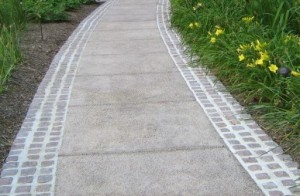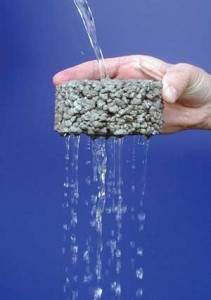
Fall in Love with Permeable Concrete
 In a previous post on The Glamour of Gravel, I mentioned that in a drought-prone climate such as ours, it can be considered a more environmentally friendly choice than concrete. In this post, I’d like to clarify that I was referring to conventional concrete and not permeable concrete (also sometimes referred to as porous concrete, pervious pavement, no-fines concrete, gap-graded concrete or enhanced-porosity concrete). The use of permeable concrete is, in fact, among the Best Management Practices recommended by the EPA and other agencies for the management of stormwater runoff.
In a previous post on The Glamour of Gravel, I mentioned that in a drought-prone climate such as ours, it can be considered a more environmentally friendly choice than concrete. In this post, I’d like to clarify that I was referring to conventional concrete and not permeable concrete (also sometimes referred to as porous concrete, pervious pavement, no-fines concrete, gap-graded concrete or enhanced-porosity concrete). The use of permeable concrete is, in fact, among the Best Management Practices recommended by the EPA and other agencies for the management of stormwater runoff.
In urban areas, we deal with stromwater runoff by building sewer systems that channel the water directly to lakes, rivers and other surface waters rather than into the ground. This runoff picks up toxins such as E. coli, sediments, phosphorus, zinc, cadmium and copper as it travels, requiring expensive water purification systems to cleanse the water before it reenters the natural water cycle.
Permeable concrete is exactly what the name says, it is a concrete mixture that is porous, thereby allowing water to infiltrate and pass through it into the ground beneath. Pervious pavement reduces stormwater runoff and recharges groundwater. It is less prone to cracking or buckling from temperature extremes, requires less frequent patching than conventional concrete and properly installed, should easily last more than 20 years.
 Importantly, the subgrade of permeable concrete filters pollutants. When water moves through soil it is called “infiltration.” Infiltration is the way underground water sources are replenished. As water infiltrates, many soils and plants filter out certain pollutants, helping maintain water quality. The earth is still the largest water filtration system around! And the diversion of surface waters does eventually affect the quality of groundwaters. It may take decades or even centuries for rain or melted snow to reach the deepest layers of the earth from which many wells draw water for human consumption, however, that water does come from the surface. So reducing stromwater runoff matters and is something we should all care about, especially in a climate such as ours in the Dallas, Texas area.
Importantly, the subgrade of permeable concrete filters pollutants. When water moves through soil it is called “infiltration.” Infiltration is the way underground water sources are replenished. As water infiltrates, many soils and plants filter out certain pollutants, helping maintain water quality. The earth is still the largest water filtration system around! And the diversion of surface waters does eventually affect the quality of groundwaters. It may take decades or even centuries for rain or melted snow to reach the deepest layers of the earth from which many wells draw water for human consumption, however, that water does come from the surface. So reducing stromwater runoff matters and is something we should all care about, especially in a climate such as ours in the Dallas, Texas area.
So next time you are planning on installing a new walkway or driveway, consider permeable concrete; there’s a lot to like about it.